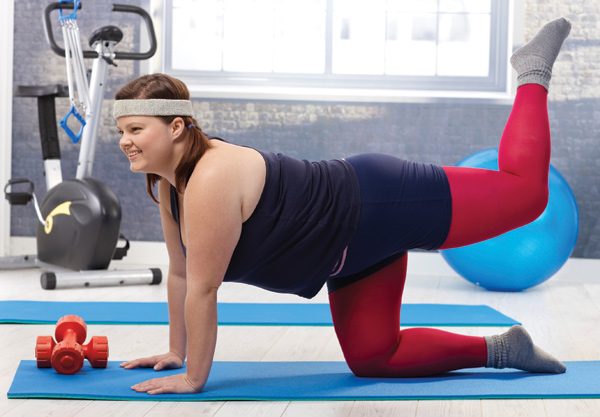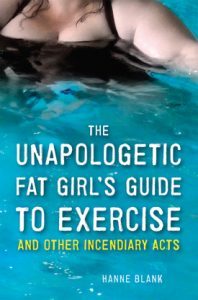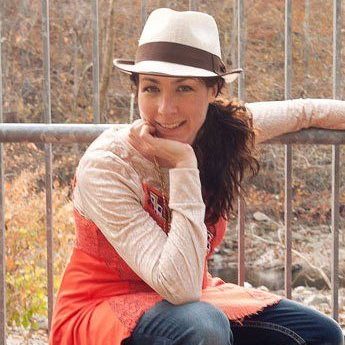 The Unapologetic Fat Girl’s Guide to Exercise author Hanne Blank, wants you to move, just for the love of it.
The Unapologetic Fat Girl’s Guide to Exercise author Hanne Blank, wants you to move, just for the love of it.
The gym can be a scary place under the best of circumstances. Add to that being fat-bodied and it can be downright inhumane, but it doesn’t have to be. In fact, it shouldn’t be, because we all have the same right to participate in our own body practice—just ask the author, fat activist, and exercise enthusiast Hanne Blank.
In her latest book, The Unapologetic Fat Girl’s Guide to Exercise and Other Incendiary Acts, Blank makes one thing perfectly clear. There is no wrong way to have a body, and no one and nothing should stop you from enjoying it. One of the best ways you can do that is through movement: “Exercise gives your body to you. It blows the dust off and gives it a little shine, and it hands it over with a weird little curtsey that makes you understand, maybe for the first time, that this body is yours, is actually kind of wonderful, maybe even miraculous.”
With The Unapologetic Fat Girl’s Guide to Exercise, Blank has crafted a funny, inspiring, and powerful message that contains practical guidance and body-affirming ideas. It’s part manifesto, part armchair therapist, and part everything you always wanted to know but were afraid to ask–style advice, and will have you up and moving for the simple pleasure of it.
What inspired the book?
I have a bad habit of going to the library and the bookstore looking for the book I want to read, or the book I wish I had as a resource, and not finding it. This is the point where I usually end up throwing up my hands and saying, “I guess I’m going to have to write it myself, then.” That’s basically what happened with this book, too. I wanted a book that spoke to my needs and concerns, as a fat woman who exercises and enjoys it and benefits from it. I didn’t need a book that told me how to exercise—there are a billion books out there that will tell you that. But there were no books that talked about dealing with locker-room freak-out, or weight limits on exercise machines, or the psychological side of exercising when you’re fat, or dealing with other people’s reactions to you exercising as a fattie—or even practical things like what to do about chub rub, and where the hell do you find sports bras that fit you if you’re a 56J.
These are all legitimate things and information that people need to help improve their quality of life. They’re things I wanted to know about when I started to exercise, and things that I, and other fat exercisers I know, had to figure out the hard way. The hard way is a pain in the ass, though, and there are enough other obstacles to exercising happily as a fat person—so that having to do it all the hard way, with no resources or affirmation, is really enough to keep a lot of people from doing it at all. That’s a shame, and totally unnecessary.
Why is exercise for fat women an incendiary act?
Moving your body for your own reasons, taking pleasure in moving your body, is incendiary for fat women because fat women’s bodies aren’t seen as deserving of that care, that attention, or that freedom to move and take up space in the world. Asserting your right to move, to sweat, to occupy space, to move through space, to challenge yourself physically, to improve your relationship with your body—these are all things that fat women are overtly and covertly told are “not for them.” I call “bullshit” on that.
Why do you prefer the term “body practice” to “fitness regime” or “exercise program”?
Exercise and fitness have a lot of negative implications for a lot of fat people. For starters, there’s the presumption that “fitness” is a size and a body-fat percentage, not a state of physical capacity and stamina. There’s the presumption that “exercise” is nothing more than a mechanism for inducing weight loss and making bodies look certain ways.
That puts a lot of seriously unrealistic pressure on the person doing the physical movement. I prefer the idea of “practice”: something you do on a regular basis, with an eye toward competence and improvement, but that does not have arbitrary goals. Like a religious practice or a meditative practice or practicing music, the practice itself is really the point.
Why is it important to pursue movement simply for your own pleasure?
Because you can. Because there’s no good reason to let anyone take that elemental pleasure away from you. On a fundamental, radical level, your body is the only thing you have that is really under your control. Why give away your pleasure? Why give away your autonomy? Take it back. And then move [your body] like you stole it, because in a very real way you did.


How has the response been? Any particular passage or part that readers have responded to?
I’ve found that people really respond to the message that moving your body doesn’t have to be punitive, it doesn’t have to hurt, and that it’s actually OK to do things that are fun. People seem to really appreciate being reminded that your body doesn’t know the difference, or care, that you’re moving it while you do something that delights you [or] performing the same motions at a gym on some exercise machine.
What do you hope your queer and genderqueer readers get from the book?
I love this question. I especially hope that LGBT readers will pick up this book, because an awful lot of issues about alienation from the body and weirdness in fitting into mainstream cultural spaces can crop up for members of the queer community, too. The experiences that fat people have with these things aren’t necessarily the same as the experiences that LGBT people have, but the underlying dynamics are often very similar, because they all tend to center around the experience of body-based prejudice and being told that there are things about you and the way you are embodied that are wrong and unworthy. As a result, some of the same coping strategies can help.
How do we end fat bias?
The same way we keep moving toward eliminating any other kind of body-based bias. We call it out when we see it, we talk about why it’s wrong, we try to reduce the harm that gets done, and we work on acting like we live in a world where there is no wrong way to have a body and where being human actually does get you your fair share of human dignity. (hanneblank.com)


